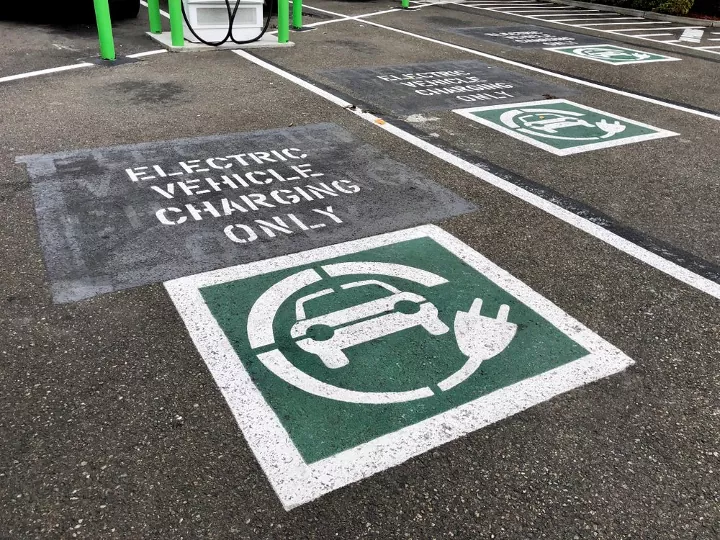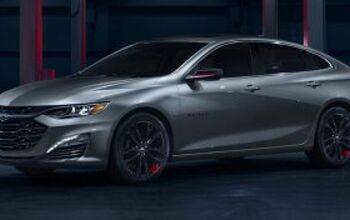Gas War: U.S. House Suggests Ending California Emissions Authority, White House Says Nope

On Tuesday, the White House voiced its opposition to a Republican bill scheduled to be voted on by the U.S. House of Representatives that would prevent California from receiving federal waivers to set standards limiting the sale of gasoline-driven automobiles.
With the issue of what people will be allowed to drive in the future becoming yet another hot-button political issue, there’s little chance of the bill making it through Congress. Democrats have made widespread electrification a major platform and they’re currently the dominant party in the Senate, likely meaning the “ The Revoking Engine and Vehicle (REV) Requirements Act” would stall there.
However, the proposal is not incorrect in asserting that California's Clean Air Act waiver gives it a large amount of influence over national vehicle policies. Republican Congressman Doug LaMalfa (CA-01) pointed this out while introducing the bill.
"California is abusing their waiver authority and its status as the largest market in the United States to force this change on all Americans. We have a free market; therefore if Americans truly wanted to make the switch to electric vehicles, then they would buy them — no government interference necessary. The truth is that electric vehicles aren't a reliable option for everyone, nor are they affordable. Just a few days after the California Air Resource Board's mandate came out, Governor Newsom had to publicly beg electric vehicle owners not to charge their cars due to concerns of the power grid and blackouts. This winter, residents in the Sierra Nevada mountains lost power for days due to heavy snow storms. People with electric vehicles couldn't charge them to evacuate or heat their homes. Those who want an electric vehicle and can afford it have every right to purchase one. People shouldn't be compelled to purchase them. The bottom line is that the government has no right to mandate what kind of car you drive." said Congressman LaMalfa.
Due largely to possessing the ability to self-regulate, California is known for having some of the strictest emission rules in the country. However, the region is also highly influential and has over a dozen other supportive states (New York, Massachusetts, Vermont, Maine, Pennsylvania, Connecticut, Rhode Island, Washington, Oregon, New Jersey, Maryland, Delaware, Colorado, Minnesota, Nevada, Virginia, and New Mexico) claiming to adhere to its benchmarks for vehicle emissions in lieu of federal guidelines.
Though exactly how this works is a little confusing, as those locales don’t enjoy the same regulatory waiver provided by the Environmental Protection Agency (EPA). These also aren’t issues that are being voted on by the public and instead tend to be declarations made by state leadership that feel a political kinship to California.
While this has created an incredibly hazy regulatory environment at both the federal and state level under the Trump administration, Biden’s doesn’t seem to care due to being in broad alignment with the policies pushed by the California Air Resources Board (CARB). Furthermore, the EPA cannot legally issue a formal ban on combustion vehicles.
Arguments could be made that today’s federal standards represent de facto bans by how heavily they incentivize electric vehicles while punishing automakers for building modestly sized, economical models that burn gasoline. But it still doesn’t qualify as an outright ban, even if the White House has set goals for what portion of the market should be electrified and vowed to make all government vehicles EVs in the coming years. The point is that the Biden administration presumably doesn’t want to get in California’s way when it’s taking actions it’s prohibited from engaging in.
Under Trump, the EPA sought to end California’s ability to self-regulate after market analysts suggested Californian policy would split the U.S. market by forcing automakers to comply with regions adhering to more stringent emission rules and state-backed vehicle bans. At the time, the White House claimed this would result in Americans having limited choices, being forced into more-expensive automobiles, and ultimately advantage China as the world’s largest battery producer. However, the legal hurdles confronted by the Trump administration were vast and Biden undid any headway it had made by subsequent executive order.
In May, CARB asked the EPA to approve its plan to require all new vehicles sold in the state by 2035 to be either electric or plug-in electric hybrids, setting the stage to ban automobiles using fossil fuels. Automotive News reported that the proposed bill would strip the EPA of authority to grant that waiver, adding that California has already received waivers from the EPA to set its own emissions limits for heavy trucks and other vehicles.
From Automotive News:
The White House noted Congress gave California authority to regulate emissions from vehicles more than 50 years ago, but did not issue a veto threat. The Biden administration has repeatedly refused to endorse setting a date to phase out the sale of internal combustion engine cars and trucks.
Former President Donald Trump, who is seeking the 2024 Republican presidential nomination, has repeatedly accused the Biden administration of seeking to force an end to internal combustion vehicles.
Under an EPA proposal to cut vehicle emissions, automakers are forecast to produce 60 percent EVs by 2030 and 67 percent by 2032 to meet requirements, compared with 5.8 percent of U.S. vehicles sold in 2022 that were EVs.
California's zero-emission rules [claims it] will cut by 25 percent smog-causing pollution from light-duty vehicles by 2037.
The rules mandate that 35 percent of the new cars sold be plug-in hybrid electric (PHEV), EVs or hydrogen fuel cell by 2026. That proportion will rise to 68 percent by 2030 and 100 [percent] by 2035.
A total of 17 states have agreed to adopt California's EV rules.
CARB's regulation would allow automakers to sell up to 20 percent PHEVs by 2035 with a minimum 50-mile all-electric range.
Leadership understands that California is a keystone state in terms of emission policy and sells enough vehicles to make it borderline impossible for the industry to rationalize building a separate product line. With a cadre of other states claiming to be on board with CARB standards, it almost doesn’t matter what the federal government’s standards are. The industry will have to comply with California’s emissions laws if it hopes to sell within the United States, with the federal government still capable of funding the shift by adding new corporate incentives and indefinitely prolonging an EV tax credit scheme that was originally supposed to expire.
Ultimately, it doesn’t really matter if the proposed bill makes it through the House and Senate. Biden will almost assuredly veto it so that The Golden State can continue doing some of the legwork the federal government is legally barred from doing. It certainly calls into question exactly where the boundaries of regulatory law exist. But it’s an effective tactic and helps guarantee the desired policies are enacted nationally, regardless of which party happens to be in power at the federal level.
Though the above hardly addresses the issue in a comprehensive manner. The fact remains that there’s an affordability issue with modern vehicles that’s been even tougher for EVs to cope with. Electric cars also haven’t yet reached parity with gasoline or diesel vehicles in terms of uptime and there are lingering questions about serviceability as it pertains to DIY maintenance. We also have a large contingent of consumers that remain broadly unwilling to purchase any nontraditional powertrains until they’re absolutely positive it’s better than what they currently own.
That’s not to suggest battery and hybrid-powered vehicles don’t have benefits. At-home charging is extremely convenient for those who can adapt it to their lifestyle and the instantaneous torque of electric motors remains thrilling. But they probably won’t work for everyone and former claims that EVs were ecologically superior are starting to fall flat as the world learns more about cobalt or lithium mining and realizes that the energy for these vehicles still has to be sourced from somewhere that’s still emitting pollution.
[Image: ZikG/Shutterstock]
Become a TTAC insider. Get the latest news, features, TTAC takes, and everything else that gets to the truth about cars first by subscribing to our newsletter.

A staunch consumer advocate tracking industry trends and regulation. Before joining TTAC, Matt spent a decade working for marketing and research firms based in NYC. Clients included several of the world’s largest automakers, global tire brands, and aftermarket part suppliers. Dissatisfied with the corporate world and resentful of having to wear suits everyday, he pivoted to writing about cars. Since then, that man has become an ardent supporter of the right-to-repair movement, been interviewed on the auto industry by national radio broadcasts, driven more rental cars than anyone ever should, participated in amateur rallying events, and received the requisite minimum training as sanctioned by the SCCA. Handy with a wrench, Matt grew up surrounded by Detroit auto workers and managed to get a pizza delivery job before he was legally eligible. He later found himself driving box trucks through Manhattan, guaranteeing future sympathy for actual truckers. He continues to conduct research pertaining to the automotive sector as an independent contractor and has since moved back to his native Michigan, closer to where the cars are born. A contrarian, Matt claims to prefer understeer — stating that front and all-wheel drive vehicles cater best to his driving style.
More by Matt Posky
Latest Car Reviews
Read moreLatest Product Reviews
Read moreRecent Comments
- Steve S. Steve was a car guy. In his younger years he owned a couple of European cars that drained his bank account but looked great and were fun to drive while doing it. This was not a problem when he was working at a good paying job at an aerospace company that supplied the likes of Boeing and Lockheed-Martin, but after he was laid off he had to work a number of crummy temp jobs in order to keep paying the rent, and after his high-mileage BMW was totaled in an accident, he took the insurance payout and decided to get something a little less high maintenance. But what to get? A Volkswagen? Maybe a Volvo? No, he knew that the parts for those were just as expensive and they had the same reputation for spending a lot of time in the shop as any other European make. Steve was sick and tired of driving down that road."Just give me four wheels and a seat," said Steve to himself. "I'll buy something cooler later when my work situation improves".His insurance company was about to stop paying for the rental car he was driving, so he had to make a decision in a hurry. He was not really a fan of domestics but he knew that they were generally reliable and were cheap to fix when they did break, so he decided to go to the nearest dealership and throw a dart at something.On the lot was a two year old Pontiac Sunfire. It had 38,000 miles on it and was clean inside and out. It looked reasonably sporty, and Steve knew that GM had been producing the J-car for so long that they pretty much worked the bugs out of it. After taking a test drive and deciding that the Ecotec engine made adequate power he made a deal. The insurance check paid for about half of it, and he financed the rest at a decent rate which he paid off within a year.Steve's luck took a turn for the better when he was offered a job working for the federal government. It had been months since he went on the government jobs website and threw darts at job listings, so he was surprised at the offer. It was far from his dream job, and it didn't pay a lot, but it was stable and had good benefits. It was the "four wheels and a seat" of jobs. "I can do this temporarily while I find a better job", he told himself.But the year 2007 saw the worst economic crash since the Great Depression. Millions of people were losing their jobs, the housing market was in a free fall, people were declaring bankruptcy left and right, and the temporary job began to look more and more permanent. Steve didn't like his job, and he hated his supervisors, but he considered himself lucky that he was working when so many people were not. And the federal government didn't lay people off.So he settled in for the long haul. That meant keeping the Sunfire. He didn't enjoy it, but he didn't hate it either, and it did everything he asked of it without complaint.Eventually he found a way to tolerate his job too, and he built seniority while paying off his debts. There was a certain feeling of comfort and satisfaction of being debt-free, and he even began to build some savings, which was increasingly important for someone now in their forties.Another bit of luck came a few years later when Steve's landlord decided to sell the house Steve was renting, at the bottom of the housing market, and offered it to Steve for what he had in it. Steve's house was small and cramped, and he didn't really like it, but thanks to his savings and good credit he became a homeowner in an up and coming neighborhood.Fourteen years later Steve was still working that temporary job, still living in that cramped little house that he now hated, and still drove the Sunfire because it wouldn't die. For years now he dreamed of making a change, but then the pandemic happened and threw the economy and life in general into chaos. Steve weathered the pandemic, kept his job when millions of people were losing theirs, and sheltered in place in that crummy little house, with Netflix, HBO, and a dozen other streaming services keeping him company, and drove to and from work in the Sunfire because it was four wheels and a seat and that's all he needed for now.Steve's life was secure, but a kind of dullness had set in. He existed, but the fire went out; even when the pandemic ended and life returned to normal Steve's life went on as it had for years; an endless Groundhog Day of work, home, work, home. He never got his real-estate license or finished college and got his bachelor's, never got a better job, never used his passport to do some traveling in Europe. He lost interest in cars. "To think how much money I wasted on hot cars when I was younger", he said to himself. He never married and lost interest in dating. "No woman would want me anyway. I've gotten so dull and uninteresting that I even bore myself".Eventually the Sunfire began to give trouble. With 200,000 miles on the clock it was leaking oil, developing electrical gremlins, and wallow around on blown-out shocks. Steve wasn't hurting for money and thought about treating himself to a new car. "A BMW 3-series, maybe. Or maybe an Alfa Romeo Giulia!" He began to peruse the listings on Autotrader. "Maybe this is just what I need to pull out of this funk. Put a little fun back in my life. Yeah, and maybe go back to the gym, and who knows, start dating again and do some traveling while I'm still young enough to enjoy it!"Then his father passed away and left him a low-mileage Ford. Steve didn't like it or hate it, but it was four wheels and a seat, and that's all he needed right now."Is it too late to have a mid-life crisis?" Steve thought to himself. For what he needed more than that stable job, that house with an enviably small mortgage payment, and that reliable car was a good kick in the hindquarters. "What the hell am I afraid of? I should be afraid that things will never change!"But the depression was like a drug, a numbness that they call "dysthymia"; where you're neither here or there, alive or dead, happy or sad. It was a persistent overcast, a low ceiling that kept him grounded. The Sunfire sat in his driveway getting buried by the needles from his neighbor's overhanging pine trees which were planted right on the property line. "Those f---ing pine trees! That's another thing I hate about this damn house!" Eventually the Sunfire wouldn't start. "I don't blame you", he said to the car as he trudged past it to drive the Ford to another Groundhog Day at that miserable job.
- Yuda Cool. Cept we need oil and such products. Not just for fuel but other stuff as well. The world isn't exactly ready to move to wind and solar and whatever other bs, the technology simply isn't here yetNot to mention it's too friggin expensive, the equipment is still too niche and expensive as it stands
- Rna65689660 Picked up my wife’s 2024 Bronco Sport Bad Lands!
- Inside Looking Out Android too.
- Ajla I'm replacing the transmission in a 2006 GMC van.


































Comments
Join the conversation
California is the ideal state to be a criminal. You can commit brazen robberies multiple times a day. Just keep it below the democrat approved dollar amount and no worries. Carb is just shoplifting on a grand scale. P.S. remember when Oakland was sketchy and San Fran was ritzy? Been there lately? It's almost like San Fran said "hey, how can we be more like the other side of the bay, they get all the best homeless"
If Jesus were alive today, the white Christian nationalists on this site would stone him for blasphemy within 30 seconds.